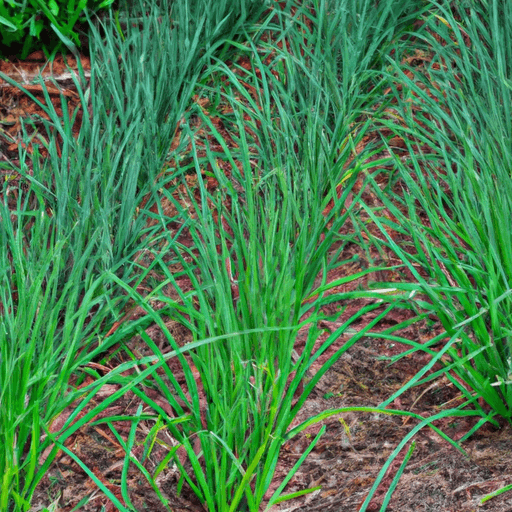Companion planting with onions is a gardening technique that boosts the health and yield of a garden. By growing onions alongside other plants, gardeners can enhance their growth and protect them from pests. This practice, used for centuries, has numerous benefits including improved soil health, reduced pesticide use, and increased crop productivity.
Onions can be companions to various vegetables, herbs, and flowers. They deter pests, provide natural defense, and promote the overall health of companion plants. With attention to soil, pests, and proper techniques, gardeners can reap the rewards of onion companion planting.
The Benefits of Companion Planting With Onions
Companion planting with onions offers numerous benefits. This includes increased crop productivity, reduction in pesticide use, and improvement in soil health.
When onions are planted alongside other crops, they provide natural pest control by repelling certain insects and pests. This helps to protect the companion plants from damage and promotes healthier growth.
Additionally, onions have a unique ability to balance soil nutrients, enhancing the overall fertility of the garden. By interplanting onions, gardeners can maximize their space and achieve a bountiful harvest.
Companion planting plays a crucial role in sustainable gardening practices. It promotes a more holistic and environmentally-friendly approach to cultivation. Through the strategic combination of plants, gardeners can create a harmonious ecosystem that supports the health and productivity of their crops.
Onion Companion Plants for Root Vegetables
Beets and onions make excellent partners in the garden due to their similar soil conditions and nutrient requirements, maximizing both space and harvest potential.
When it comes to companion planting strategies for maximizing root vegetable yields and improving soil health in root vegetable gardens, planting beets alongside onions can be highly beneficial.
Both plants thrive in well-drained soil with a pH level of 6.0 to 7.0. By growing them together, they can share the same space and effectively utilize the available nutrients in the soil.
Additionally, the presence of onions can help deter pests that may harm the beet plants.
This companion planting technique not only optimizes garden space but also promotes healthy growth and abundant yields of both beets and onions.
Onion Companion Plants for Leafy Vegetables
Spinach thrives when planted alongside onions due to the pest repellent properties of the onions, resulting in a pest-free harvest and natural defense against pests for the spinach plants.
This companion planting strategy offers effective pest control for leafy vegetables, such as spinach, while maximizing garden space. By interplanting onions with spinach, gardeners can create a symbiotic relationship between the two plants.
Onions release a strong aroma that repels pests, reducing the risk of insect damage to the spinach. Additionally, the onions act as a natural barrier, deterring pests from reaching the spinach plants.
This pest control strategy not only ensures a healthier crop but also eliminates the need for harmful pesticides. By incorporating onions as companions for leafy vegetables, gardeners can enjoy a bountiful harvest and maintain a pest-free garden.
Other Onion Genus Plants
Garlic, leeks, shallots, and chives thrive when grown alongside onions, as they share similar nutrient requirements and simplified fertilization methods. This makes them ideal companion plants for onions, especially when considering growing onions in containers.
Importance of soil health for onions:
- Nutrient absorption: Onions rely on nutrient-rich soil for healthy growth and bulb development.
- Disease prevention: Well-draining soil reduces the risk of fungal diseases that can affect onion plants.
- Water retention: Soil with good moisture-holding capacity ensures onions receive adequate hydration.
- Pest control: Healthy soil promotes beneficial organisms that can naturally control pests, reducing the need for chemical pesticides.
When growing onions in containers, it is crucial to prioritize soil health. By providing the right nutrients, moisture, and drainage, gardeners can ensure their onions thrive and produce a bountiful harvest.
Onion Companion Plants for Brassicas
Mustard and cabbage family plants thrive when grown alongside onions, as they benefit from the protection against insect damage provided by the onions. This companion planting strategy is an effective pest management strategy for brassicas. By planting onions alongside broccoli, cauliflower, and Brussels sprouts, gardeners can maximize their garden space and promote the health and productivity of these vegetables.
The table below highlights some common brassicas and their onion companions:
| Brassicas | Onion Companions |
|---|---|
| Broccoli | Onions |
| Cauliflower | Onions |
| Brussels sprouts | Onions |
In addition to providing protection against pests, onions also help to balance soil nutrients and create a hospitable habitat for growth. By incorporating onion companions for brassicas, gardeners can optimize their garden space and maximize their yield while minimizing the need for synthetic pesticides. This natural and environmentally friendly approach to pest management is both beneficial for the garden and the overall ecosystem.
Onion Companion Plants for Fruits
Tomatoes thrive when grown alongside onions, as they benefit from the pest deterrence and healthy crop provided by the onions. Intercropping onions with fruit-bearing plants offers several benefits:
-
Improved pest control: Onions emit a strong odor that repels many common pests, including aphids and spider mites. This helps protect tomato plants from infestations and reduces the need for chemical pesticides.
-
Maximized onion yield: Growing onions alongside tomatoes allows gardeners to make the most of their available space. By utilizing companion planting techniques, onion yields can be maximized through strategic placement and efficient use of resources.
-
Enhanced nutrient uptake: Onions and tomatoes have different nutrient requirements. When grown together, they can benefit from the complementary nutrient uptake, leading to healthier plants and increased crop productivity.
-
Increased biodiversity: Intercropping onions with fruit-bearing plants promotes biodiversity in the garden, attracting beneficial insects that contribute to pollination and pest control.
Onion Companion Plants for Nightshade Crops
Onion plants provide natural pest repellent properties that can benefit nightshade crops, such as peppers and eggplants, when grown together. By incorporating onions into the garden, pest control strategies for nightshade crops can be maximized while also maximizing garden space.
Below is a table showcasing the benefits of companion planting onions with nightshade crops:
| Pest Control Strategies for Nightshade Crops | Maximizing Garden Space with Onion Companions for Nightshade Plants |
|---|---|
| Onions repel pests such as aphids and spider mites, reducing the need for chemical pesticides. | Planting onions alongside nightshade crops saves space and allows for efficient use of garden beds or containers. |
| The strong aroma of onions confuses rodents and deters them from damaging nightshade crops. | Onions act as a natural barrier against weeds, reducing competition for resources and maximizing the available growing area. |
| Onions can attract beneficial insects, such as ladybugs and lacewings, which prey on pests that commonly affect nightshade crops. | The dense foliage of onions provides shade and helps conserve moisture, benefiting the neighboring nightshade plants. |
Onion Companion Plants for Strawberries
Strawberries thrive when planted alongside onions due to their compatible growing conditions and the pest deterrence provided by the onions’ natural properties. This companion planting combination offers numerous benefits for a successful strawberry harvest.
Tips and tricks for growing strawberries with onions:
-
Enhanced pest control: Onions have natural pest repellent properties that can help protect strawberry plants from common pests like aphids and mites. This reduces the need for chemical pesticides and promotes a healthier, more organic growing environment.
-
Improved soil health: Onions and strawberries have similar soil requirements, including well-draining soil with a slightly acidic pH level. When planted together, they can help balance soil nutrients and enhance overall soil health, resulting in healthier and more productive strawberry plants.
-
Space maximization: By planting onions alongside strawberries, you can make efficient use of garden space. The vertical growth habit of onions allows them to grow upward while strawberries spread out horizontally, maximizing your garden’s yield.
-
Companion planting benefits: Companion planting with onions provides a range of benefits, such as attracting beneficial insects, improving flavor, and enhancing the growth of both plants. This symbiotic relationship helps create a thriving garden ecosystem.
Onion Companion Plants for Potatoes
Companion planting with onions offers numerous benefits for potatoes.
Not only do these two crops share similar growing conditions, but onions also provide natural pest deterrence for potatoes. Onions emit a strong odor that repels pests such as potato beetles and aphids, protecting the potato plants from infestation.
By planting onions alongside potatoes, gardeners can reduce the need for synthetic pesticides and promote a healthier and more sustainable garden environment.
Additionally, the close proximity of onion plants can help create a microclimate that shields potato plants from excessive sunlight, reducing the risk of sunscald.
This companion planting strategy not only enhances the health and yield of potatoes but also contributes to the overall pest management strategies for potatoes.
Onion Companion Plants for Lettuce
Lettuce benefits from the presence of onions as companions in the garden due to their pest-repellent properties and compatibility in terms of growing seasons and conditions. When planted together, onions and lettuce form a harmonious partnership that not only enhances the health and yield of both crops but also helps manage pests naturally.
Here are some tips for managing pests in an onion and lettuce companion garden:
-
Choose lettuce varieties suitable for companion planting with onions, such as Buttercrunch, Romaine, and Red Oakleaf. These varieties tend to thrive when planted alongside onions.
-
Practice good garden hygiene by removing any weeds, debris, or damaged plants that may attract pests. This helps maintain a clean and healthy environment for both onions and lettuce.
-
Encourage beneficial insects like ladybugs, lacewings, and parasitic wasps to your garden. These insects prey on common pests like aphids, slugs, and caterpillars, keeping their populations in check.
-
Consider using natural pest deterrents like neem oil or insecticidal soap, which are safe for both onions and lettuce. These products can help manage pests without harming beneficial insects or contaminating your crops.
Frequently Asked Questions
Can Onions Be Grown as Companion Plants With Herbs Like Basil or Mint?
Yes, onions can be grown as companion plants with herbs like basil or mint. This combination maximizes garden space and offers benefits such as pest deterrence, enhanced flavor, and improved growth. Here are some tips for growing onions with herbs.
What Are Some Common Pests That Onions Can Help Repel in the Garden?
Onions effectively repel common pests in the garden, such as aphids, carrot flies, and cabbage worms. By planting onions strategically, gardeners can naturally deter these pests and protect their crops.
Are There Any Specific Planting Techniques or Arrangements That Work Best When Growing Onions With Companion Plants?
Interplanting techniques for onions and companion plants can maximize onion yield. Planting onions and companions with similar soil conditions and nutrient requirements allows for efficient use of garden space and a bountiful harvest.
Can Onions Be Grown as Companion Plants With Root Vegetables Like Radishes or Turnips?
Onions can be grown as companion plants with root vegetables like radishes or turnips. This intercropping provides advantages such as maximizing space, balancing soil nutrients, and promoting healthy growth for both onion and root vegetable crops.
Are There Any Specific Onion Varieties That Are Particularly Well-Suited for Companion Planting?
Yes, there are specific onion varieties that are well suited for companion planting. Onions can be grown as companions with herbs like basil or mint, providing enhanced growth, flavor, and pest deterrence.







